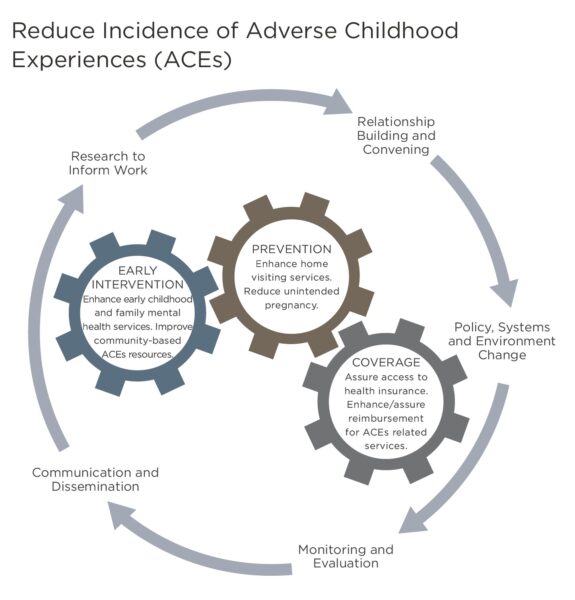In 2019, the New Hampshire Children’s Health Foundation began to implement a new strategic grantmaking initiative. This model directs funding in a more intentional and coordinated fashion to drive progress in two of our five funding priorities — Prevent and Reduce Childhood Trauma and Increase Access to Children’s Health and Dental Insurance Coverage.
Our expectation in moving to strategic grantmaking is to create true systemic change. Projects are beginning with baseline research and will include ongoing project evaluation.
To date, the Foundation has focused on conducting assessments of New Hampshire systems and strategies that can prevent and reduce the risk for adverse childhood experiences. These include home visiting, preventing unintended pregnancy, early childhood and family mental health, and strengthening referral networks for children who have been exposed to trauma.
A high-level summary of progress to date follows.
Early childhood and family mental health
While mental health services have historically been targeted towards adolescents and adults, there is growing recognition of the need for increasing the availability and capacity of services and programs to promote healthy social, emotional development for young children and their families. The Endowment for Health and the New Hampshire Children’s Health Foundation commissioned, and in March released, an assessment of the capacity of the workforce serving this population in the New Hampshire.
The objectives of the assessment were:
- To identify who is providing early childhood and family mental health services, where, how, and with what training and credentials.
- To identify barriers, beyond those of financing, to providing and accessing early childhood mental health services.
The assessment was conducted by Health Resources in Action. Additional support was provided by NH DHHS, Bureau of Children’s Behavioral Health.
Subsequently, project partners held a convening for more than 50 participants on the assessment’s findings. The executive summary is available here.
Medicaid reimbursement for childhood mental health services is set to begin by 2021, which is an important step in addressing access barriers.
Enhancing participation in Home Visiting Services
Research shows that home visiting beginning prenatally and continuing through the first few years of a child’s life has a positive impact on children and families.
Home visiting programs offer the services of trained family support specialists to visit families in their homes or other locations the family may choose to offer evidence-based services to help them:
- Get the support they need during pregnancy or bringing a new baby home from the hospital
- Build a better relationship with their children
- Meet basic family needs such as housing, transportation, utilities, or food
- Navigate school, insurance and medical systems
- Advocate for their children and their family.
Families receive individualized family support and coaching that helps them meet their parenting and personal goals. Participation is voluntary.
New Hampshire’s home visiting programs are based regionally in nonprofit family resource centers. Utilizing evidence based models, they provide assessments for routine child development, safety and postpartum depression as well as parent education, support and resource connection.
The Foundation’s interest in home visiting is one strategy to prevent or reduce adverse childhood experiences.
Program staff at the Foundation and the Endowment for Health recently conducted in-person key informant interviews to understand the current capacity, gaps, and barriers for building and strengthening a system of family resource centers to better serve families with young children (up to age three). These interviews were intended to answer the question, “How can private philanthropy dollars make a meaningful impact for this field?”
The interviews revealed successes and strengths as well as some of the challenges family resource centers have in operating home visiting programs, most connected to centers being significantly under-resourced. To begin to address the vision of building a statewide family resource center network and enhance services and staff capacities, the foundations anticipate providing strategic planning and facilitation support over the next several months.
Reduce unintended pregnancy
The Foundation’s goal to reduce unintended pregnancy seeks to assure that children are planned and thereby reduce the risk for adverse childhood experiences (ACEs). Children living in families that struggle with providing a strong social emotional environment are at higher risk for ACEs and related trauma. Access to long acting reversible contraception (LARC) enables women to plan for pregnancy.
LARC is a safe and highly effective approach to reducing unintended pregnancy. LARC device options include both the intrauterine device (IUD), as well as a small progesterone implant placed beneath the skin. An IUD provides effective protection for between three and ten years. An implant may be left in place for up to three years.
Unfortunately, access to LARC is limited due to a number of factors. Some of these include education and awareness about LARC options, health care provider training and confidence to insert IUDs or implants, ability of health care settings to keep LARC stocked due to cost, misinformation about the risks of LARC, and adequate systems within provider settings to assure same day appointment insertion of IUD’s or implants.
The Foundation’s LARC strategy seeks to address these challenges in order to make LARC widely accessible for women who feel the method fits their pregnancy plans and in turn, reduce the risk for an unintended pregnancy.
The Foundation recently completed a statewide survey of federally qualified and community health center health care providers (nurse practitioners and MDs). Results were shared with family planning and philanthropy partners who are interested in partnering on a number of actions to increase LARC accessibility. Work on these strategies is expected to begin later this year.
You Have Our Trust Fund is a funding and thought partner with the Foundation for this strategy.
Reducing childhood trauma is a complex undertaking
The Foundation’s anticipated long-term outcome by implementing these strategies will be a gradual reduction in the number of New Hampshire children experiencing multiple Adverse Childhood Experiences. The work to accomplish this is obviously complex, long-term and challenging. It will involve harnessing the synergies of a wide range of organizations and stakeholders and stimulating multi-system change.

